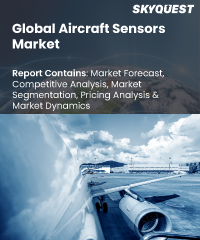
Report ID: SQMIG20A2207
Skyquest Technology's expert advisors continuously track and analyze the latest developments and updates related to aircraft sensors market. Our team of analysts stay abreast of all the recent news stories shaping the industry including new product launches by major companies, strategic partnerships, M&As, Patent filings and industry and regulatory developments.
REQUEST FOR SAMPLE
Aircraft Sensors Market size was valued at USD 4.8 Billion in 2023 and is poised to grow from USD 5.19 Billion in 2024 to USD 9.85 Billion by 2032, growing at a CAGR of 8.2% during the forecast period (2025-2032).
The major competitive factors among the leading competitors are technical and managerial efficiency, cost-effectiveness, the ability to develop and implement complex integrated system designs, and the capability to deliver solutions to customers. Major players in the aviation sensors market have undertaken a significant number of contracts, alliances, agreements, acquisitions, joint ventures, and new product launches. 'Honeywell International Inc. ', 'Safran Group ', 'TE Connectivity Ltd. ', 'Meggitt PLC ', 'Ametek Inc. ', 'Lockheed Martin Corporation ', 'Woodward Inc. ', 'General Electric Company ', 'Thales Group ', 'L3Harris Technologies, Inc. ', 'The Bosch Group ', 'Trimble Inc. ', 'Curtiss-Wright Corporation ', 'Eaton Corporation ', 'Crane Aerospace & Electronics ', 'Lord Sensing Stellar Technology ', 'Amphenol Corporation ', 'Kongsberg Gruppen ASA ', 'TDK Corporation ', 'Ultra Electronics ', 'VectorNav Technologies LLC ', 'Systron Donner Inertial ', 'Aerosonic ', 'Sensor Systems LLC ', 'Circor Aerospace'
The aircraft sensor industry is mainly driven by the high concern for aviation safety. With regulatory agencies enforcing higher standards of safety, manufacturers have begun to integrate advanced sensors that monitor critical airplane data. These sensors help identify issues before they become more significant by providing real-time information on a range of factors. Advanced airplane sensors are in high demand, and manufacturers, along with airlines, are showing greater concern over safety developments.
Growing Use of Intelligent Sensors: The trend of employing intelligent sensors brings to production the t sensor, called ACES, on Boeing 737 aircraft. Among these is the rise in the usage of smart sensors that take full advantage of technologies such as AI and ML. Data collected by such sensors, therefore, offers precious information regarding aircraft maintenance and performance in real-time. The need for smart sensors in today's modern flight is also a crucial factor in allowing for predictive maintenance; thus, increasing efficiency, both on and off operations-a trend that further innovates and expands the market in aviation sensors.
With a rough revenue share of around 36% of the global aircraft sensors industry in 2023, North America dominated the market. The region, owing to a number of critical factors, has the highest adoption of advanced aviation technologies and holds some of the world's largest aircraft manufacturers, Boeing. The same dominance also finds further evidence in massive defense and aerospace spending under the U.S. government. The intense R&D undertaken in sensor technology also accounts for the same supremacy in the market for the region. Strong demand exists for new-generation aircraft in addition to upgrades and fleet retrofits, leading the market to grow. One more critical growth factor remains in air travel and cargo transport.
Want to customize this report? This report can be personalized according to your needs. Our analysts and industry experts will work directly with you to understand your requirements and provide you with customized data in a short amount of time. We offer $1000 worth of FREE customization at the time of purchase.
Feedback From Our Clients

Report ID: SQMIG20A2207
sales@skyquestt.com
USA +1 351-333-4748